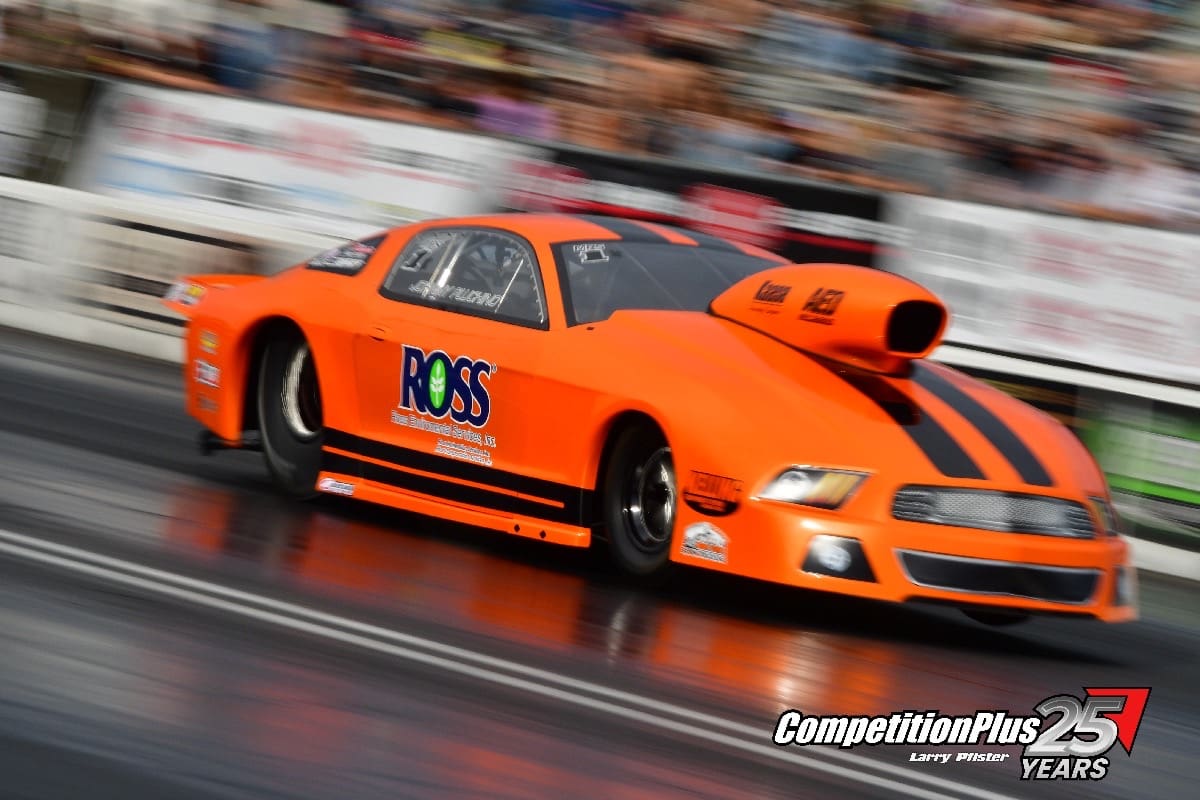 Todd Smith understands the importance of making the right decision.
Todd Smith understands the importance of making the right decision.
As a crew chief, Smith knows the wrong one can lead to a bad run. He painfully learned to make the right one can also have unintended consequences.
The right moves resulted in one of the worst runs the veteran tuner for Kalitta Motorsports ever experienced.
Despite all the precautions, Smith and wife Julie, came down with the Coronavirus, the often-deadly COVID-19.
Smith is now 100-percent sure he knows the feeling of traveling to hell and back. The problem for Smith is he had no idea the trip was on his itinerary.
“Early on, around Gainesville time, Julie and I were like, how serious can this be?” Smith described, just two days after being released from a two-week stay in the hospital. “Then after a week at home, we really started to go, okay, there’s people getting sick, there’s people dying, we better start taking some precautions. Pretty quickly, we were doing all that. Cleaning, hand sanitizer everywhere, any time we had to leave the house, we cleaned and wiped, did all these things. And so we started to buy into it a couple of weeks after Gainesville. And we were trying like crazy to be cautious.”
Caution, Smith said, only prolonged the inevitable.
“It ended up catching us by surprise,” Smith admitted.
Smith began showing symptoms back on April 16, and by the sixth day was running fevers as high as 103-degrees. Back then, after following the necessary precautions, and to this day, Smith has no definite idea of how he contracted the virus.
“We struggled for about a week trying to figure it out, coming up with all different kinds of theories Because you’re trying to backtrack every step you made and everything you did,” Smith explained. “The only thing that comes to mind to us is, we had purchased a house in January, and we had closed on it the end of January.
“It’s one of those homes that need to be completely renovated, and so we’re living close by in an apartment. So every few days we were traveling over to that house, to do some kind of work and lining up contractors.
“Typically, we were there most of the time by ourselves. There really wasn’t anyone around. When a lot of the contractors were there, we weren’t there. So there’s that theory that somehow, possibly someone was in and out of the house that had it. Or one time we might have got in close contact with someone that had it, maybe they didn’t have symptoms. Don’t know. So that was one theory, like, okay, well, maybe it’s a long shot, it’s possible.”
NBC Sports writer Jerry Bonkowski tells the story of https://t.co/Reh86n8GFm Editor Bobby Bennett’s battle with COVID-19 – https://t.co/7KaN57Bb5x pic.twitter.com/NcQ2CH57rl
— Competition Plus (@competitionplus) April 2, 2020

The Smiths, while following the recommended CDC guidelines, still had to live life in the so-called new normal while visiting the grocery store, bank and post office. They avoided restaurants, except for carry-out, leaving the opportunity to contract the virus to a pretty narrow chance.
As Smith sees it, the most frustrating aspect is 36 days after experiencing the initial symptoms is not having a clue where he picked up the deadly virus.
“The first week when we were trying to theorize on all this, it really frustrated us because we thought we were being diligent and working our way through this thing and being as cautious as possible,” Smith said. “Once I started getting really sick, I was like, ‘Oh, well, it don’t matter, you got it. You just got to figure out now how to get over it.”
Smith confirmed in the early stages of falling ill; he gave an outside consideration he might have the Coronavirus.
“I think because we were so acutely aware of all of this stuff because the media blasting the symptoms and everything like that, I was only maybe a day and a half in, or two days, and Julie was like, ‘hey, look, you got about eight out of 10 symptoms,” Smith recalled. “I said, ‘let’s go get tested. There’s no need to wait anymore. I’ve already had a fever for a day and a half, body aches, loss of fluids. Couldn’t stay out of the bathroom. I had enough symptoms like, let’s just go get tested. We got to know.”
It took an accident at home to speed up the process for the Smiths.
Smith, who was admittedly by now delirious with a fever, passed out in the bathroom and fell. As if the symptoms of the Cornovirus weren’t bad enough, Smith sustained a broken nose in the fall.
“I think that the fever just had me delirious, it was so high for so long,” Smith admitted. “It was just messing with my thinking. But ultimately when I fell, in the end, the doctor just said, ‘You were just so severely dehydrated, your heart rate went down so far, and your blood pressure dropped. You just passed out.”
“I was walking to the bathroom, that’s the last thing I remember. The next thing I remember, Julie’s trying to get me up off the floor and I’m laying in a puddle of blood and trying to figure out what happened. I just blacked out; blood pressure dropped, that was it, lights out.
“I was still at home because I was still waiting for the test results, and we had just been treating my symptoms. Julie and I had already isolated in different parts of the house by that point, but we were just treating the symptoms and waiting for the results to try to figure out what to do next.”
Multiple COVID-19 victims have stated there was a time amid their sicknesses with little or no means available to treat or cure their illness, reached a point where they gave up hope. There was a trigger of sorts. Smith’s came a couple of days after the broken nose.
“That fall, it scared Julie enough to the point, she was like, ‘Hey, I’m just going to call an ambulance because I don’t think I can get you to the hospital, what if you pass out again,” Smith recalled. “We agreed, and I got an ambulance and went to the hospital the first time.”
 Those who have experienced near-death experiences have testified there was a point where their life’s memories went through their mind. Smith was in the hospital when his low point and feeling of near-death intersected.
Those who have experienced near-death experiences have testified there was a point where their life’s memories went through their mind. Smith was in the hospital when his low point and feeling of near-death intersected.
“There was probably a day or two when that started to happen,” Smith explained. “And it was really a strange thing that was happening. I started to get all of these thoughts coming through my head, and remember we’re delirious, right? We’re high on fever. And the things that were popping in my head were these life events, everything from three, four years old up to current. Everything from winning races to when I was a child, getting baptized, graduating high school, my first car, winning races, getting married, when my son was born. Just all these things and they were just flashing in front of you.
“I remember thinking, I wasn’t scared, I was just thinking, man, I wonder if this is it. I wonder if this is what goes through your mind when you’re getting close to the end. And it was pretty spooky; it was pretty spooky. It took me a day or two to get past that. And then, typical crew chief mindset, I started analyzing everything, like, well, what about this, what about that, what about this? Maybe it was this; maybe it was that. And within a few days, I got past that, and I just got back to dealing with my symptoms. That was the real low point for me.”
Smith is quick to point out the Cornovirus affects more than just a victim’s respiratory system and fever spikes. In his case, simultaneously, he was dealing with severe migraines, intense digestive issues, aches and pains, and even at times odd dreams which led to psychological challenges.
“There’s not a thing on your body that you’re not acutely aware of hurting or suffering in some way,” Smith admitted. “You’re coughing; you have a headache; it makes your head hurt, body aches, muscle aches, fever, high fever, and then chills and shivering. And you can’t stay out of the bathroom; you can’t get enough fluids in you, every single part of you is like, ‘man, I think my toe hurts.”
Whether it was the myriad of medications or just one of the unpublished issues, the dreams got odd, which led to further migraines.
“There definitely were a lot of weird dreams in there, and strange things that were happening. As soon as I would be falling asleep or drifting off into something, sometimes I would have these body jerks, or you snap your leg, or sometimes I sat straight up in bed. It was kind of weird. And then when you’d drift off, you’d have these dreams, and when you’d wake up you’re like, ‘man, that was really strange.”
“Luckily for me, an hour later, I couldn’t remember what the dream was about. I just remember having them. And I just kept thinking; it’s got to be the fever. It’s got to be the fever. You’re so jacked up; it’s got to be something that’s playing tricks on your mind. But either way, it was really strange.”
While the symptoms of the illness are enough to break one’s spirit, it was the isolation which was just as bad as all of those as mentioned earlier combined.
“It’s pretty tough,” Smith said. “It’s probably come down to each individual person and how dependent you are on your family and how close they are to you. It was tough on me because Julie and I are so close, we’re together all the time, other than when I’m gone racing, sometimes when she’s not there. So it was like, man, this just really sucks.
“I knew it was not just only hard on me. I knew it was hard on her because they’re sitting at home just waiting for a phone call or waiting for any kind of information from the doctor. And you just feel helpless that there’s nothing you can do. You know it’s for the best, you got to stay away from each other and try to keep the other one from getting sick.
“It’s emotionally tough, and all you can do is try to live through it. The best way we got through it was FaceTime. Luckily they let you have your cell phone in your room and sometimes she would FaceTime me, and I couldn’t even pick my head up off the pillow to talk to her, but if I just listened to her talk, it just made you feel better.”
Add in during this emotionally debilitating time, Julie’s father suffered an accident while working with his tractor, and passed away a day later.
Julie, who had been Smith’s rock of support, was now dealing with tragedy on multiple fronts.
“It was just a crushing time, and my heart was breaking for her,” Smith said. “It was like, ‘God, I just need to be with my wife, comfort her through this; a really difficult time and I couldn’t. All I could do is talk to her on the phone and try to comfort her the best way that I could, and it was really challenging.”
Then Julie began showing symptoms of the Coronavirus.
“We were just like, ‘Oh, you got to be kidding me. You got to be kidding me. This can’t be happening. And then ultimately, she tested positive, so it was really tough,” Smith recalled.
“She had all the same similar symptoms, just not as severe. But ultimately I told her, go to the emergency room because she has asthma, she’s already had asthma for years. Well, she was having trouble breathing one day, and I just said, ‘don’t mess around, just go.”
“She went to the emergency room, they watched her for a couple of hours, checked all her vitals, ultimately gave her a whole bunch of prescriptions of stuff and said, go home and watch your symptoms. So she came home, took all of her meds, watched everything real close, got her breathing back under control somewhat to the point where she’s got this nasty cough that we all have.”
 Smith said the psychological effect of the experience will affect his attempt to move forward, at least in the short-term but understands at this point life will never be the same.
Smith said the psychological effect of the experience will affect his attempt to move forward, at least in the short-term but understands at this point life will never be the same.
“In the back of your mind, you keep thinking of, I just want to get back to normal,” Smith said. “Then you realize that everything’s not normal anymore. It’s a pandemic and all this and you start to get apprehensive. I’m just so ready to go see my team and shake everyone’s hand and give them a hug and say, ‘Hey, let’s go racing or whatever. And then you just go, I don’t think I can do that.
“You get a little bit freaked out by all that stuff. And so I hope some of that stuff subsides and I start to feel better over time about all of that, and then we all start to learn about what we can actually do when we see each other, how we’re going to navigate all that. But it does mess with your brain. Whatever happens to you when you go through this, and you come out of it, I think you’re a different person.”
“We’re all going to face [life as it used to be] once we get back to the track. I keep going through my mind, man, how are you going to do all these things? Especially as men, right?
“You’re constantly seeing people; you’re constantly shaking hand and giving hugs and high fives and all this kind of stuff. And you’re trying to wrap your head around how we’re going to deal with all that. It’s like, man; I don’t really know. I guess we’ll come up with a fist bump or an elbow bump or just stand back five feet and say, hey, it’s good to see you.”
Smith knows there will be more documented cases of those involved in drag racing who experienced the tragedy of the coronavirus illness, and from this experience will create a special bond amongst the survivors.
“Until you’ve really gone through this, as we have, and anybody else has, and you get to that dark place where you think your days are over. I think that when you know somebody else has been through that, I think you’re going to be forever connected. It’s this event in your life where you almost lost your life, and you have a whole new respect for life. And so if you have a friend or you know someone that’s gone through it, I think you can’t help but be connected the rest of your life.”
Smith must be 28 days symptom-free before he can donate plasma to help other victims, and being a recipient of the antibodies contained in recovered victims’ plasma helped in his bid to come back.
“Julie and I were discussing it even a couple of weeks ago,” Smith said. “You feel like when you’ve received the plasma, and then when you feel like it’s really helped, at least we did, automatically, in our head, was like, ‘man, as soon as we get well, we can, we need to donate. We just need to pay it forward. Somebody paid it forward for us. And we need to pay it forward.”
“It’s the least thing you can do because when you get the plasma, you feel like it saved your life. You can’t forget that you’re so thankful for it. It’s like, what can I do? What can I do to help pay this forward?”
 Until the time comes, Smith is just trying to get his life back together.
Until the time comes, Smith is just trying to get his life back together.
“It’s been slow, but honestly, the most important part is eating,” Smith revealed. “When you lay there for three weeks and watch television, see all these food advertisements, you start thinking about all these things you want to eat, especially when you get out of the hospital, and you quit eating hospital food.
“Eating, resting and then making sure that I’m working on my breathing a fair amount every day. If we can go for walks in the morning and try to get out of the house for a few hours, I think it really helps.
“As my breathing gets better, I got to start getting my muscles back. I lost so much muscle mass; I’m so weak that I got to start building that back out. So, we’ll get there. It’s going to be a slow process, and you understand that well.
“I’m looking at the calendar going, man, if we go race in August, or maybe even in July, it’s like, I got to get my act together here.”
Smith has seen all the social media banter; those who call the Cornovirus a hoax or just a bad case of the flu, and can’t help but want to respond with all the reasons his experience was nothing like the flu.
“You just want to grab the people and just shake them and go, ‘you don’t know what you’re talking about,” Smith said. “Until you live through this, there’s just no way for you to have an outside opinion of what you think or you might perceive it to be.”
“We all know now that it’s affecting everybody differently, but if your level of symptoms is really severe like ours were, you know that’s like, dude, this is not the flu. This is not a cold. This is not just something you just have, and you shake it off in a week or so, and you go on back to your normal work life. When you live through it, you completely understand how severe it is.
“You don’t just get it and get over it, you don’t have a few bad weeks, and then you get over. It’s got a lingering effect for we don’t even know how long. We don’t know at this point how long all this is going to be this way.
“And how hopeless does it make you feel when you’re in the hospital, and they’re treating you for everything but what you have. That part can be frustrating. I guess, somewhat thankful in some parts of it I was so out of it and I was so delirious, I was just like, whatever, they’re giving me something. Yeah, it might work, it may not work.
“I think I was conscious enough to realize that these people don’t know either. They’re all learning, the doctors are learning. And thankfully for me, a lot of the doctors were really honest, and they just said that. I think they’re just throwing stuff on the wall until they get something to stick.”
But for Smith, the encouraging part was seeing those who were treating him never gave up. And for him, he will never give up trying to help those who encounter this experience with hell on earth.
Smith will deal with the unknowns, and keep doing the right thing regardless of how uncertain the future is.
“Am I going to get better in another month or two months or six months? Or never?
“Or is it going to be this way forever? And so that part is probably as frustrating as anything to me. You’re so used to getting your whole life. If you get sick, you get over it and move on. It’s like, okay, well, we don’t know if we’re going to get over this.”


































